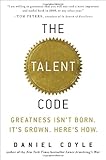57 Meditations on Kicking @$$ in Business and Life"4.8/5 stars" on Amazon
The 10 Reasons Mark Zuckerberg Has A Tougher Job Than Lebron James
Tweet CommentI love basketball.
I shoot hoops a few times a week; play in a fantasy basketball league and watch local NBA game on any night of the 8 month season.
As I watched the NBA playoffs this season, I realized that as tough as it is to be a pro in the NBA, it’s tougher to be a pro in business.

Mark Zuckerberg (at G8 Summit 2011) has it tougher than Lebron James (pictured dunking the ball below)
Top 10 Reasons Why Business Is Harder Than A Pro Sport Like Basketball
1) It’s Way Harder To Keep Score (In Business)
In basketball (and most sports), there’s a score that everyone can look at it…you know exactly where you stand versus your opponent.
In business, the score is much tougher. It may be a revenue goal (which most businesses don’t keep in real-time).
And in terms of how you compare to your opponent (i.e. competitor), you have to figure out how to determine your competitor’s score (which is very difficult in many businesses).
Tip: Chunk down your goals to smaller increments so that you know where you stand without waiting too long (like I illustrate in The 10 Maniacal Steps I Take For Setting Goals.
2) Business Has Many Clocks To Look At; Sports Has Just One
In basketball, there’s always a clock ticking. You know that there’s 10:05 left in the half or 1:07 left in the game. …
No comments yet | Continue Reading »
Friday, April 1st, 2011
Are Cubbie Fans The Reason The Cubs Have Sucked For 100+ Years?
Tweet 3 CommentsThe Chicago Cubs have not won a championship since 1908 – that’s the longest drought in North American sports…not just baseball…any major sport.
So, why have the Cubs sucked for so long?
This article is an excerpt from a terrific new book called Scorecasting that dug into a theory of the Cubs Curse.
The theory is that the Cubs don’t have as much incentive to win…and it’s due in large part to their fans. …
3 comments so far (is that a lot?) | Continue Reading »
Sunday, December 12th, 2010
5 Easy Tips On How To Be Successfully Prepared (From An NFL Coach)
Tweet 3 Comments[My new friend Umberto Leone was an Assistant Coach in the NFL for the Cleveland Browns and Oakland Raiders; he wrote the article on preparation below (with some editing for space by me).]
As U.S. President Abe Lincoln once said about the importance of being prepared:
“If I had 6 hours to chop down a tree, I’d spend 4 hours sharpening my axe.”
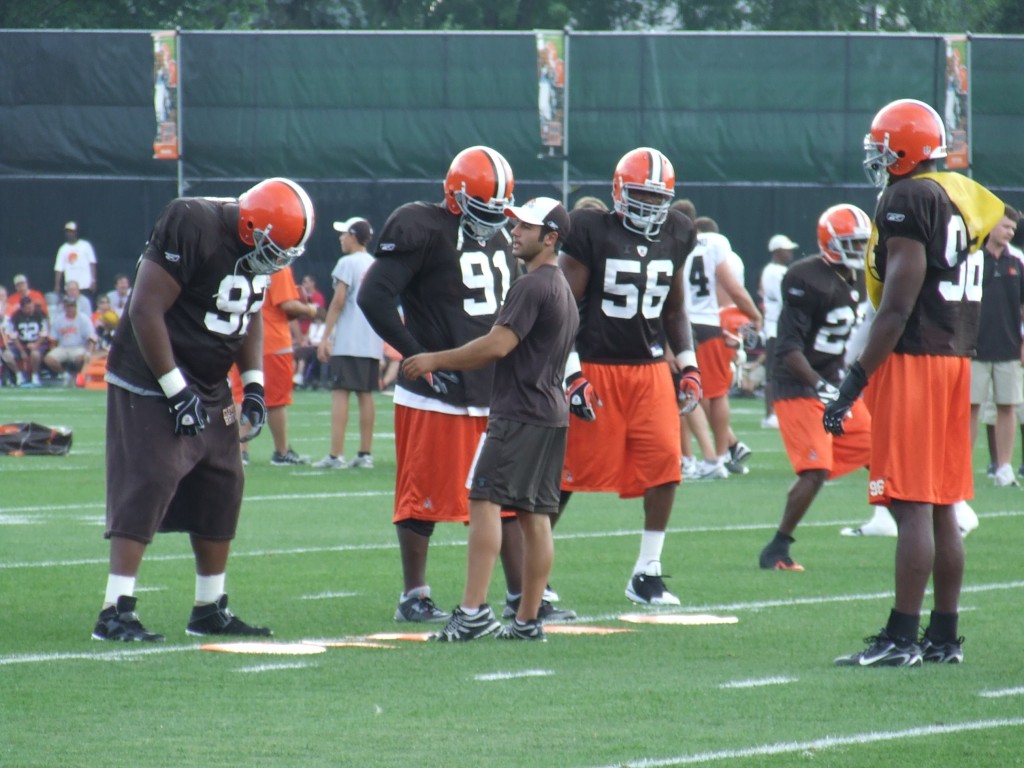
Coach Leone corralling the Cleveland Browns
As a former Assistant Coach in the National Football League for five seasons, as well as three years assisting on the collegiate level, my work-life revolved around preparation.
I learned some valuable tips & pointers on preparedness and look forward to sharing them with you.
Preparation Tip #1: Teamwork
You hear the word “teamwork” thrown around the sports world all the time. Many athletes thank their teammates for the individual awards they receive.
Not only is teamwork a requirement on the field of play, within the preparation process teamwork is crucial.
As a coaching staff, each of the preparation duties is shared amongst the entire staff.
For example, one coach may be responsible for the 1st and 2nd down game plan while another coach’s responsibility is 3rd down and 2 minute.
Another coach may have the Red Area and Goal Line situations.
You must rely on the successful work of each individual coach in order for the whole coaching staff to be properly prepared.
Teamwork Preparation Questions For You:
- Do you efficiently spread responsibilities among your team?
Do they have assignments as specific as who’s responsible for 1st down decisions or what you do when you’re close to the “Goal Line?
Preparation Tip #2: Ask Yourself the “What If” Questions
To properly prepare you have to be able to ask and answer the appropriate “what if” questions; this helps you increase and broaden your mindset.
An increased and broadened mind allows you to think about a variety of possibilities and how to prepare for them all.
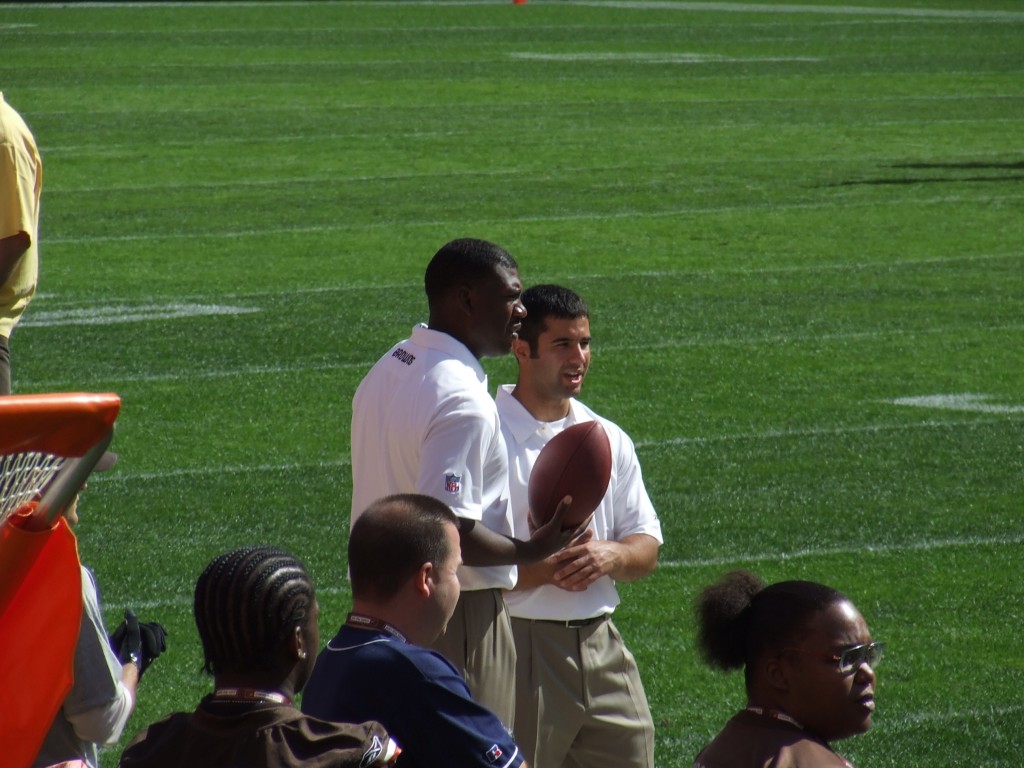
Coach Leone (on right) talks things over with Coach Mel Tucker
In football terms, some examples of the “what if” questions we asked ourselves each week to help us prepare:
- “What if they start using a no huddle offense”?
- “What if they fake a field goal or punt”?
- “What if they give us a trick play “?
- “What if they bring a blitz that we have never seen before”?
- “What if its 4th and 1 and they go for it”?
- “What if its 4th and 5, we are losing by 3 points with the ball at the 35 yard line, 45 seconds left in the game and we have no timeouts left – do we kick a field goal or go for the first down”?
- “What if our QB gets hurt”?
When you ask yourself the appropriate “what if” questions, it will deepen and broaden your mind and thus drastically improve your preparation level.
What-If Preparation Questions For Your Team:
- Does your team discuss “What-If” contingency plans?
- Are you prepared in the event a key person on your team resigns?
- Are you prepared for your largest customer or partner leaving you?
Preparation Tip #3: Role-Play
In football it was vital for us to think as our opponent would think.
We’d study ourselves in a way that the opponent would: understanding our weaknesses, knowing the areas that they would attack, and being able to prepare accordingly.
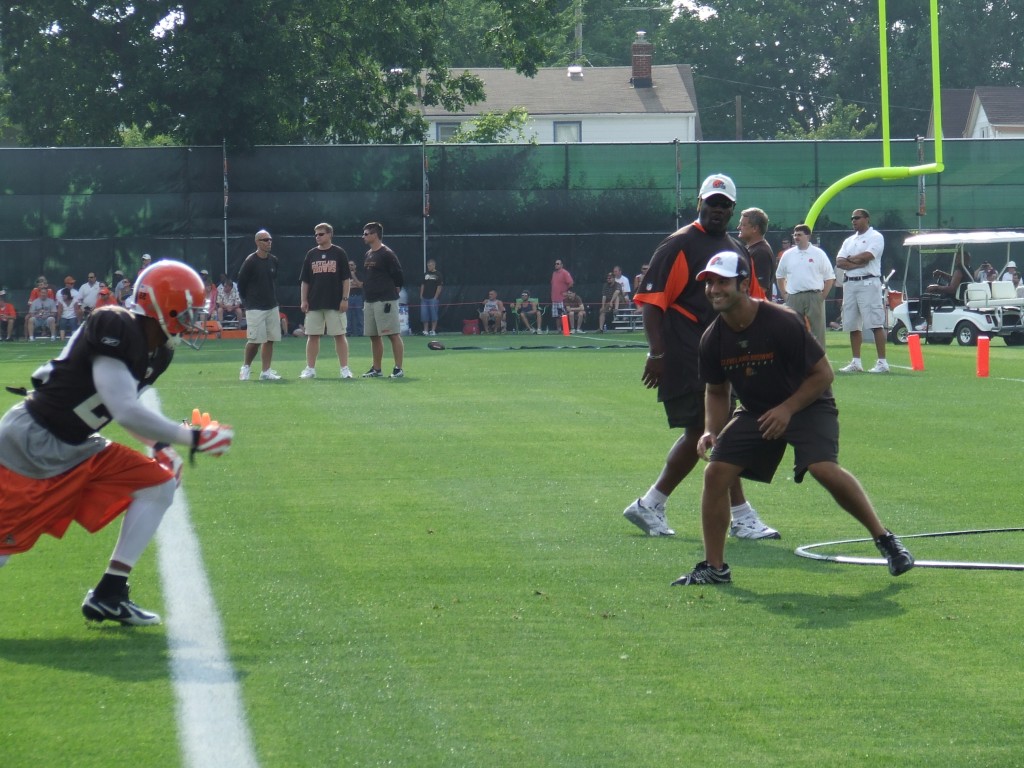
Brandon McDonald runs at Coach Umberto
For example, we prepared for the following game by studying our opponent on film (and over time collecting a huge database of their plays).
During practice our Scout team would utilize those plays and run them against our own team.
At times we would run the play a little differently – attacking the weak area of our team in a way that would make the opponent’s play more successful.
For example, if we are playing the Eagles, our scout team wouldn’t have a slow non-athletic QB: we’d put the closest version to Michael Vick we had on our team to better role play that position.
Role-Play Preparation Questions For You:
- Do you have a database of plays you and your competition rely on?
- Do you ever role-play any scenarios in your business?
- If you have to have to fire someone, do you use a colleague to role-play the script with them beforehand?
- If you are giving an important speech, have you ever tried practicing it aloud to another person whose opinion you trust?
Preparation Tip #4: Research & Study Hard
Though we only played one game every week, the amount of preparation that went into every game was astounding.
From the Sunday evening following the afternoon game, to the Saturday night team meal and sometimes even until the Sunday morning breakfast, we were preparing.
Legendary coach Joe Paterno once said
“The will to win is important, but the will to prepare is vital”. As NFL Coaches, we all definitely have that will.
Without doing the research, your mind is not prepared to ask the appropriate “what if” questions. Your mind is no shape able to role-play either.
Imagine being a football coach and never having seen the opposing team play a game. You would have no idea what plays they like to do, what strengths and weaknesses they have as a team, etc.
Research/Study Hard Preparation Question For You:
- Are you researching & studying your goals comprehensively enough that you have identified the major “What-If” and Role-Playing scenarios you could face?
Preparation Tip #5: Practice and Review
In preparation, once you are satisfied with your thought process — ideally by completing preparation tips 1 through 4 above — you need to practice your plan…through action!
Learning by actions allows you to experience things you originally didn’t think about.
As a football coach, the daily practices we had were crucial to the team being prepared for each week’s game. In addition to the role-playing practices mentioned above, we did individual position drills.
Each position worked on individual drills pertaining to their position:
- Lineman worked on blocking fundamentals;
- Defensive backs worked on covering fundamentals;
- And wide receivers worked on route running.
And if we knew that the other team posed a problem for us on any of the fundamental levels we made sure we worked that fundamental area more intensely.
For example if they had small – quick wide receivers our DB’s worked more on foot quickness drills.
Practicing at different speeds was also important:
- We started practice with a walk-through in which we did at half speed the plays we were going to work the day in practice.
- Then we went to the individual/fundamentals part of practice so that we could run the plays successfully.
- Then we ran the plays at full-speed in a competitive fashion.
Practice & Review Preparation Questions For You:
- Do you practice your skills & timing before YOUR big game/event?
- Do you identify the fundamentals that you’re weakest on and prioritize those?
- Do you take your sales & marketing “plays” and practice those at a slower pace to make sure you can nail them when it’s “game-time”?
Successful End Results
Our expectation was to be prepared enough that no matter what happened during the course of the game, we were able to handle it in a successful fashion.
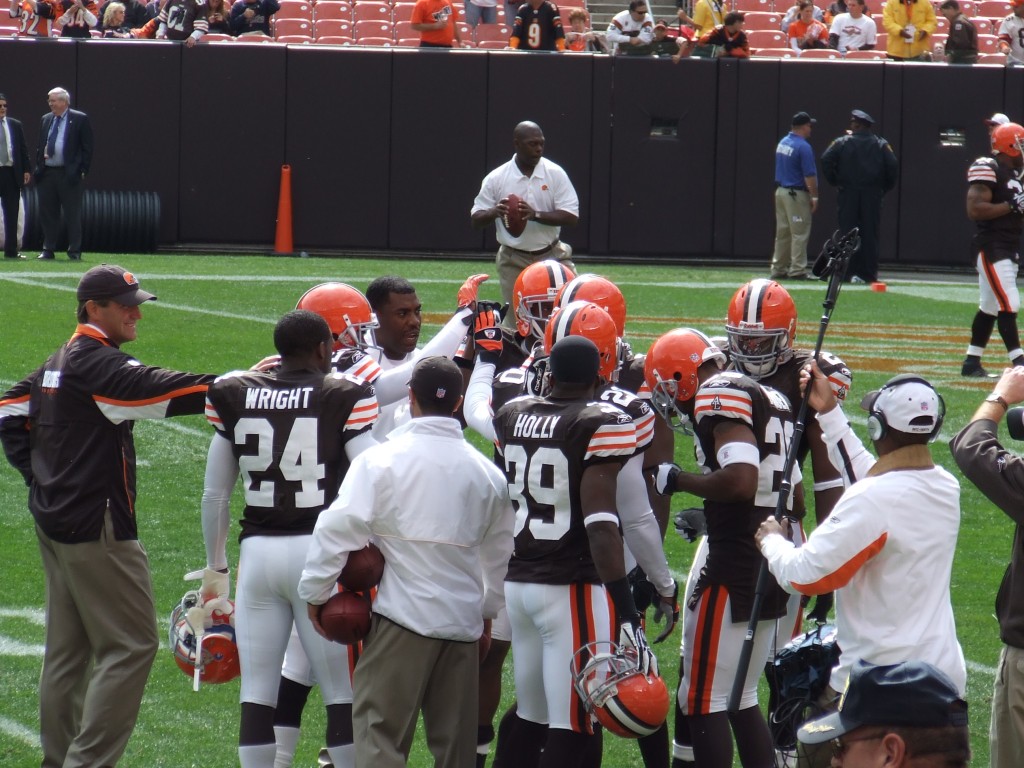
Anything the opposing team did, from the most usual to the most extreme, our team was prepared enough that they could face it all and still be successful.
I believe these preparation tips I learned from the NFL could be used to help you with anything from preparing for a job interview to preparing a business plan to preparing for an exam.
The key is to get prepared for whatever key challenge you face.
A Recap Of My 5 Tips To Successful Preparation
- Teamwork — Organize and utilize your available resources. Be proficient and efficient.
- What-If Questions — Increase and broaden your mindset. Evaluate rational scenarios.
- Role Play — Put yourself on the other team. Think as they think and prepare yourself accordingly.
- Research and Study Hard — The foundation for your preparation.
- Practice and Review — Learn by your actions before the real event takes place.
Following these 5 guidelines will go a long way to helping you achieve number 6 in this article – Successful End Results!
If you want to get in touch with Umberto Leone he asks that you do so through his LinkedIn profile.
3 comments so far (is that a lot?) | Continue Reading »
Thursday, June 17th, 2010
How To Recharge Yourself To Make It Through Life (Happy)
Tweet 2 CommentsI was discussing ‘recharging’ with some friends over pizza in the Italian North Beach neighborhood of San Franciso the other night.
The concept of recharging caught my eye when I read the amazing book: The Power Of Full Engagement by Tony Schwartz & Jim Loehr.
I was captivated by the stories that Tony & Jim told of how they studied professional tennis players.
I must have lent my copy of the book out so I’m going by memory here…as I recall, Tony & Jim studied two groups of tennis pros:
- Group A: The Top 10 Tennis Pros (e.g. 1 to 10) (who make millions per year) and
- Group B: The Lower-Ranked Tennis Pros (e.g. ranked 100 to 500) (who just scratch their way by career-wise)
When they studied videos of the two groups of tennis pros, they noticed something odd: there was no real difference in the talent of the two groups (a guy ranked 200 had essentially the same quality serve, forehand, backhand, etc. of a guy ranked #1).
Amazing, right?
So, what WAS the difference between the two groups
Answer: careful analysis showed that the main difference was the way the two different groups “recharged.”
Examples of recharging were:
What the players did between points
Group A had a a nice steady breath and a casual glance at their racket (perhaps adjusting a string or two) or looking up at place in the crowd or sky
Group B, on the other hand, spent time in between points getting angry with themselves or an umpire (e.g. about the last point they may have lost), distracted by someone in the crowd, or were otherwise fidgety.
A look at what the players did in between games and sets was similar: Group A player was relaxed and regrouping while Group B player was talking to himself or a fan or the umpire.
I recall that the authors may have also mentioned that they observed differences between how the two groups acted (or recharged) between matches too.
So, how does this relate to you?
Well, Tony & Jim pointed out that business-folks need recharging even more than athletes (because we typically don’t have coaches to help us out, structured training or dedicated time off (such as Spring/Summer for most professional basketball players or Winter for baseball players).
Reading Power Of Full Engagement inspired me to be more conscious of how I recharge my batteries.
So, I set up a new recharging strategy…it’s been a couple of years now and I thought I’d lay out my schedule of recharging.
Here’s a typical day for Rob Kelly:
- 6:00am to 7:15am: I wake up and focus on creative works (I read about concepts or play guitar or map out ideas on giant post-it notes) (Check out my article on 5 Easy Steps On How To Be An Early Riser.
- 7:30am to 8:30am: I work out (yoga or basketball) (RECHARGING)
- 9:15am to 11:30am: I work my job (and I get up at least once during this time to stretch my legs, drink water, etc.)
- 11:30am to 12noon: I drink a caffeinated beverage and read the San Francisco Chronicle (RECHARGING)
- 12noon to 2:30pm: I work more on my job
- 230pm to 3pm: I take a 30 minute break for food and read the Wall Street Journal (RECHARGING)
- 3pm to 5:15pm: I work my job
- 515pm to 6pm: I pick up groceries for dinner (RECHARGING)
- 6pm to 7:45pm: I work more on my job and do some light other work (perhaps write a blog posting)
- 7:45pm to 8:15pm: I cook dinner
- 8:15pm to 9:15pm: I watch quality TV (RECHARGING)
- 9:30pm to 10pm: I read low-intensity books (usually fiction…so as to ease my way into sleep)
- By 10:15pm, it’s usually light’s out (7 to 8 hours of sleep — RECHARGING)
I’m also trying to apply consistent recharging to longer time periods such as:
- Weekends — I recharge through at least one visit to nature
- Every Quarter — I try to take a long weekend at least once a quarter
- Summers — I try to spend two weeks each summer with my family
- Annual — I try to do one off-site family vacation per year
- Bi-Annual — I try to leave the United States once every two years (that’s something I learned from How To Innovate: 5 Tips From Leading Innovators.
I’m really happy with the results so far. A consistent recharging has made me feel healthier and more balanced.
2 comments so far (is that a lot?) | Continue Reading »
Saturday, June 5th, 2010
The Top 10 “John Wooden” Searches On My Blog
Tweet 2 CommentsMy John Wooden Series is receiving a bunch of traffic these days after his recent death.
I always look at what keywords people search on to make sure I’m doing my best to provide good resources on them.
Towards that end, here are the top 10 John Wooden searche phrases (in quotes below) that I’m receiving, along with relevant links/answers:
- “john wooden quotes” — Here’s a good list of Wooden quotes (along with how many people like each one)
- “john wooden 7 principles” — This refers to the “7 Things To Do” that Wooden’s father taught him
- “john wooden steps to success” — Here’s my post on Wooden’s 8 Steps To Success
- “pyramid of success john wooden” — Here’s a cool image of Wooden’s Pyramid with
- “bill gates and john wooden” — my old colleague Bob Evans of Information Week wrote here that “Bill had a basketball autographed by John Wooden, the legendary UCLA basketball coach and a master strategist himself. I asked about the ball and Bill’s feelings toward Coach Wooden, but Bill just smiled and said we’d have to get to that another time.”)
- “john wooden records” (the best listing I can find of John Wooden’s records appears on this “John Wooden: A Coaching Legend Page at UCLABruins.com)
- “drink deeply in books’-wooden” (this is from Wooden’s father’s list of “Seven Things To Do” — the exact wording is “Drink deeply from good books, especially the bible.”)
- “best john wooden book for teenagers” — I believe that “Wooden: A Lifetime of Observations and Reflections On and Off The Court” is the best Wooden book for teenagers
- “charlie rose interviews john wooden” — Here’s a link to Charlie interviewing Wooden!
- “john wooden personality type” — I researched this and found out that he is likely an ENFJ and Enneagram Type 1
As you know, John Wooden is a hero of mine — if there’s anything else you’d like to know about him, please comment below.
2 comments so far (is that a lot?) | Continue Reading »
Friday, June 4th, 2010
John Wooden Quotes From “Pyramid of Success”
Tweet 5 Comments[This is part of a John Wooden Leadership Series I’m doing celebrating his 100th year of life]
The following is excerpted from John Wooden’s amazing book The Pyramid of Success.
He begins with this overall quote:
“Success is peace of mind which is a direct result of self-satisfaction in knowing that you did your best to become the best that you are capable of becoming.”
And here are Wooden’s 15 “Building Blocks” of the Pyramid of Success along with quotes on each:
1) Industriousness — “There is no substitute for hard work. Worthwhile results come from hard work and careful planning.”
2) Enthusiasm — “Enthusiasm brushes off upon those with whom you come in contact. You must truly enjoy what you are doing.”
3) Friendship — “Friendship comes from mutual esteem, respect and devotion. Like marriage, it must not be taken for granted but requires a joint effort.”
4) Cooperation — “Cooperate with all levels of your co-workers. Listen if you want to be heard. Be interested in finding the best way, not in having your way.”
5) Loyalty — “Loyalty to yourself and to all those depending upon you. Keep your self-respect.”
6) Self-Control — “Practice self-discipline and keep emotions under control. Good judgment and common sense are essential.”
7) Alertness — “Be observing constantly. Stay open-minded. Be eager to learn and improve.”
8) Initiative — “Cultivate the ability to make decisions and think alone. Do not be afraid of failure, but learn from it.”
9) Intentness — “Set a realistic goal. Concentrate on its achievement by resisting all temptations and being determined and persistent.”
10) Condition — “Mental-Moral-Physical. Rest, exercise and diet must be considered. Moderation must be practiced. Dissipation must be eliminated.”
11) Skill — “A knowledge of and the ability to properly and quickly execute the fundamentals. Be prepared and cover every little detail.”
12) Team Spirit — “A genuine consideration for others. An eagerness to sacrifice personal interests of glory for the welfare of all.”
13) Poise — “Just being yourself. Being at ease in any situation. Never fighting yourself.”
14) Confidence — “Respect without fear. May come from being prepared and keeping all things in proper perspective.”
15) Competitive Greatness — “Be at your best when your best is needed. Enjoyment of a difficult challenge. “
5 comments so far (is that a lot?) | Continue Reading »
Friday, April 30th, 2010
3 Tips To Developing Your Talent (From The World’s Secret Talent Hotbeds)
Tweet 1 CommentI just finished reading an amazing book called The Talent Code (I recommend it to any person wanting to further develop their talent).
The author Daniel Coyle visited the the talent development programs responsible for some of the top talent in the world, such as:
- Moscow for tennis
- Soccer in Sao Paolo, Brazil
- Dallas, Texas for a vocal studio
- A music academy in New York’s Adirondacks
- Baseball in the Caribbean
But you don’t have to attend one of these talent pools to improve yourself.
Coyle says that the key to talent development is a neural insulator that we all have inside us called myelin.
He argues that every human skill — whether its leadership, computer programming, sports, music or anything else — is created by chains of nerve fibers carrying signals.
And it is myelin that wraps layers around these fibers…and there are certain things we can do to increase the thickness of this myelin, resulting in faster and more accurate movement and thoughts.
He recommends a few approaches to increasing your myelin (and thus your talent).
The 3 Keys To Talent Development
1) Deep Practice
Focus your practice on repeating core skills, attend to your mistakes, practice those skills again.
“Struggle is not an option: it’s a biological requirement.”
The “Ten-Year, Ten-Thousand Hour Rule” is indeed valid — This finding from 1899 stated that world-class expertise in every domain (whether it’s cello, chess or tennis) requires roughly a decade or 10,000 hours (that would be about 3 hours a day, every day for a decade).
It’s the Ten-year rule that is often used in developing talent in young people (many parents try to time the beginning of a child’s practice of a skill to be about 10 years before that child will peak physically.
That’s why some children are best to start practicing certain skills when they’re 5 to 10 years old).
Did you know that comedian Jerry Seinfeld practiced his first Tonight Show set 200 times beforehand, according to this awesome profile of Seinfeld in the New York Times.
Overall, Coyle identifies three tips for improving practice:
- Chunk it Down — Break down the components of the skills into as many parts as you can (and practice those slowly).
- Repetition — Repeat the chunked-down components around three hours a day.
- “Feel It” — You should feel in tune with what you’re practicing, especially to identify the mistakes you make (so as to immediately work on correcting them).
2) Ignition
Coyle points out that ignition is key to developing talents — it’s a secret source of energy that we can tap into.
Some examples:
“I Want To Be Like Them”
There are examples of entire countries being “ignited” by the display of talent of one individual.
For example, in South Korea’s case it was on May 18th, 1998 when Se Ri Pak won the McDonald’s LPGA Championship — she was the first to do so from her country.
Pak “ignited” many women in her country as shown by stats over the following 10 years later: by 2007, 45 players from South Korean had one about one-third of the LPGA Tour events.
Anna Kournikova is Coyle’s other example of “I want to be like them.”
That same summer of 1998, Kournikova reached the Wimbledon semifinals and became an overnight sensation (her good looks certainly helped).
Russia was ignited and within 10 years the World Tennis Association Top 100 was home to five times as many Russian tennis players.
“Primal Cues”
Ignition can come in other forms — one study showed that an extremely high percentage of political leaders (Ghandi, Caesar, Napoleon, Bill Clinton) had one thing in common: they had lost their parents at a very early age.
Coyle reasons that the leader group’s loss of a parent triggered a primal cue that they were no longer safe…and that unlocked a massive energy source for them to tap into.
He points out that of history’s fastest runners, for example, they were on average the fourth child of 4.6 children — in other words, there is a pattern of the younger you are in your family, the faster you can run.
In this case, the primal cue is” You’re behind, better keep up!”
3) Master Coaches
Finally, Coyle says that a “master coach” is key to developing talent.
He says that a master coach possesses the following virtues:
- Vast knowledge
- Perceptiveness
- A habit of providing short and rapid feedback
- High moral standards (honesty)
I was thrilled that Coyle identified John Wooden, my favorite coach/teacher, as an example of a master coach.
I hope you enjoyed these highlights on developing talents…but I only just scratch the surface of Coyle’s amazing book.
Buy/read it!
1 comment so far | Continue Reading »
Monday, April 26th, 2010
Eight Steps To Success By John Wooden
Tweet 2 CommentsIn honor of John Wooden turning 100 this year, I’m doing a series on Wooden including tips for success.
Here’s his “Eight Suggestions for Succeeding” from Wooden: A Lifetime of Observations And Reflections On And Off The Court (which I highly recommend you read!).
- Fear no opponent. Respect every opponent.
- Remember, it’s the perfection of the smallest details that make big things happen.
- Keep in mind that hustle makes up for many a mistake.
- Be more interested in character than reputation.
- Be quick, but don’t hurry.
- Understand that the harder you work, the more luck you will get.
- Know that valid self-analysis is crucial for improvement.
- Remember that there is no substitute for hard work and careful planning. Failing to prepare is preparing to fail


